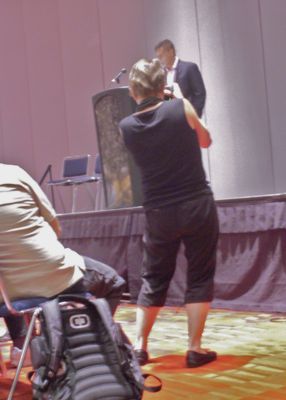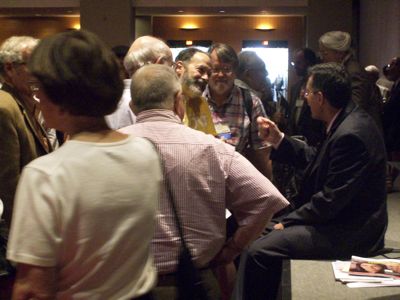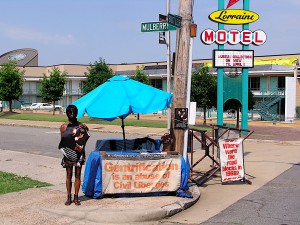As I watch the deficit battle in Washington with fascinated horror, I can’t help but noticing the threads of religion that run through it:
Barack Obama is a self-avowed quasi-Niebuhrian pragmatist who has come out of the mainline Protestant tradition. Like so many mainliners these days, he has distanced himself from organized religion; part of that mainline pragmatism is to stick to religion only when it doesn’t get in the way. He doesn’t seem to be drawn or driven by any particular transcendent moral or ethical ideals. You will also notice that he doesn’t go to religious services on a regular basis.
There are at least two religious types within the Tea Partiers. First, there are the followers of the Prosperity Gospel. Generally speaking, the Prosperity Gospel holds that religious success (salvation) is tied to material success; in one common American form, it ties in with residual American Calvinism, and holds that the wealthy are the elect, and those without money are hellbound without possibility of salvation. Whatever the specific form of Prosperity Gospel, if you’re not wealthy, you are morally culpable, you need to pray harder, and the government should not help you out.
Second, you can find the libertarian atheists among (or at least allied with) the Tea Partiers. These are often people who follow the fundamentalist atheism of Ayn Rand and her cohorts. This often takes the form of deifying the individual human, and rejecting as anathema any coordinated effort to help out the poor and unfortunate, who are not deified. The fundamentalist Randian atheists reject any call to a higher moral authority out of hand; sometimes, they’re hard to distinguish from the quasi-Niebuhrian pragmatism of Barack Obama and his cronies.
Ordinary Christian evangelicalism, committed to its own high principles around various social issues, continues to affirm that the churches can and should play a major role in delivering social services. They find themselves allied with the Tea Party’s efforts to de-fund government as much as possible. Catholics who are aligned with their religion’s hierarchy are in much the same position. However, both the Christian evangelicals and the Catholics are committed to government intervention in social issues like marriage and abortion, and many Christian evangelicals and most Catholics remain committed to letting the government fight poverty, out of their Christian commitment to helping the poor; at some point, they will have to confront the vast gulf between themselves on the one hand, and the Prosperity Gospelers and Randian atheists on the other hand. (My guess is that many of them will jump the gulf and join the Prosperity Gospelers or the fundamentalist Randian atheists.)
What is most striking to me is that so many theological groups are missing from the public coverage of the debate. Where, for example, are the mainline Protestants who have been influenced by the various liberation theologies (the feminist, black, GLBT, etc., liberation theologies)? Also missing from public coverage is any mention of the various groups doing ecological theology, including liberal Christians, humanists, and Neo-Pagans.
Religious liberals have been left out of the debate? — this should not be a great surprise. Most religious liberals and religious moderates long ago decided that they would keep their religion out of any discussions of public policy. And having once ceded the public square to fundamentalists, religious conservatives, and religious nutcases (i.e., the Prosperity Gospelers, etc.), we’re finding it very difficult to get back in.



